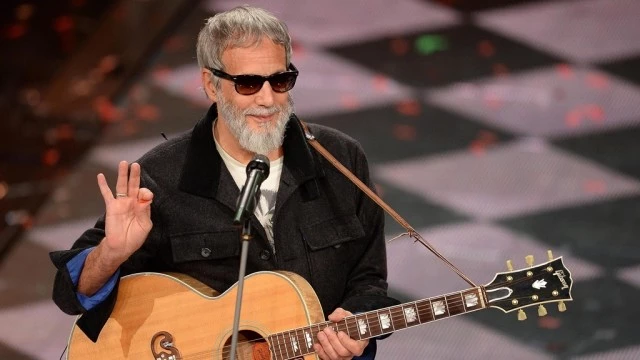
|
|
24.11.2014 15:13
The most famous convert to Islam and one of the most successful pop stars of the 70s: Yusuf Islam, better known as Cat Stevens, is on tour in Germany. Malibu, California: a man swims off the coast. All of a sudden a storm approaches. The waves get heavier. Captive to the current, the man starts drifting. In distress, he begins to pray: should he survive, he would devote the rest of his life to God. Shortly after, a wave drops him off safely on the shore. The man converts to Islam and changes his name to "Yusuf Islam." Before that, he was called Cat Stevens, the 70s pop musician who sold over 50 million albums. He sells all his instruments and puts an end to his musical career. Oh, baby, baby, it's a wild world! Flashback: in 1967, the Londoner Steven Demetre Georgiou is 19 years old. The son of a Greek-Cypriot father and a Swedish mother releases his first album, "Matthew & Son," under the pseudonym "Cat Stevens." It reaches number seven in the UK charts. But his second album "New Mast
|
|
|
The most famous convert to Islam and one of the most successful pop stars of the 70s: Yusuf Islam, better known as Cat Stevens, is on tour in Germany.
Malibu, California: a man swims off the coast. All of a sudden a storm approaches. The waves get heavier. Captive to the current, the man starts drifting. In distress, he begins to pray: should he survive, he would devote the rest of his life to God. Shortly after, a wave drops him off safely on the shore.
The man converts to Islam and changes his name to "Yusuf Islam." Before that, he was called Cat Stevens, the 70s pop musician who sold over 50 million albums. He sells all his instruments and puts an end to his musical career.
Oh, baby, baby, it's a wild world!
Flashback: in 1967, the Londoner Steven Demetre Georgiou is 19 years old. The son of a Greek-Cypriot father and a Swedish mother releases his first album, "Matthew & Son," under the pseudonym "Cat Stevens." It reaches number seven in the UK charts. But his second album "New Masters" flops. A subsequent infection with tuberculosis seems to end his young career before it really began.
Cat Stevens is bedridden and depressed. Yet, in this state, he manages to write more than 40 songs. Simply arranged, they combine his voice with acoustic guitar and leave little place for musical experimentation. This new intimate sound becomes the recipe for his success, to be repeated for his next albums. Songs like "Wild World," "Morning has Broken" and "Father and Son" turn Stevens into a worldwide pop icon.
It all ends ten years later, when Cat emerges from the floods as Yusuf. Converting to Islam in 1978, he completes his eleventh studio album, gets rid of his stage name and withdraws completely from the music business and public life. He starts a Koran school in London and gets involved in UN social projects.
Negative headlines
In the late 80s, Yusuf Islam is back in the headlines. Salman Rushdie, author of the novel "The Satanic Verses," has been accused of blasphemy against Islam. The Iranian religious leader Ayatollah Khomeini issues a fatwa against Rushdie in 1989, ordering to kill him.
On British television, Yusuf Islam says that if Rushdie were to show up at his door, he wouldn't provide him shelter, but deliver him directly to Khomeini. It's indirect support for the call for murder. He later tries to put his statement into perspective - it was all a big misunderstanding, journalists had set him up. In 1996, tells the Berliner Zeitung newspaper that as a Muslim, he positions himself "between the radicals and the moderates." Israel then definitely sees him as a radical, prohibiting him from entering the country in 2000 because he donated money to Hamas, the Palestinian organization.
The peace train
Over 20 years after putting the guitar aside, Yusuf unexpectedly picks it up again. The career restart is just as radical and consequent as his departure was in 1979. And again, a particular event leads him: September 11, 2001. He feels it's time to sing for freedom, to represent the vast majority of Muslims who have absolutely no connection to extremism.
At a concert for the Nelson Mandela Foundation in 2003, Yusuf Islam is back on stage as a pop musician, performing his song "Peace Train." He'd taken a long time to decide whether to play his old material and whether it went along with his religious convictions. But then he found a simple answer - whatever brings about goodness is right and everything that has bad consequences is wrong.
Since his comeback, he has released three albums. His latest, "Tell 'em I'm Gone," came out in October. Although the name "Yusuf" is printed in large letters on the cover, there's also a sticker with "Cat Stevens" next to it. Apart from the name, he hasn't changed much since the 70s. Although his beard is grayer and he wears glasses, his voice and guitar are just as charming. His fans are getting what they want to hear.
Yusuf Islam is everywhere on social media - on Facebook, YouTube and Twitter. On Tuesday (18.11.2014), he posted a photo online showing him in front of a piece of the Berlin Wall. On his post, he "es his song "Tuesday's Dead: " "We must try to shake 'em down ... Try to turn the world around ... one more time."
Yusuf is playing in Germany "one more time," with the "Peace Train... Late Again" tour having kicked off in Berlin on November 20. At a price between 75 and 100 euros, tickets have been snapped up by fans. After all, it might be the last chance to hear his songs live - should Yusuf suddenly decide to change course again.


|